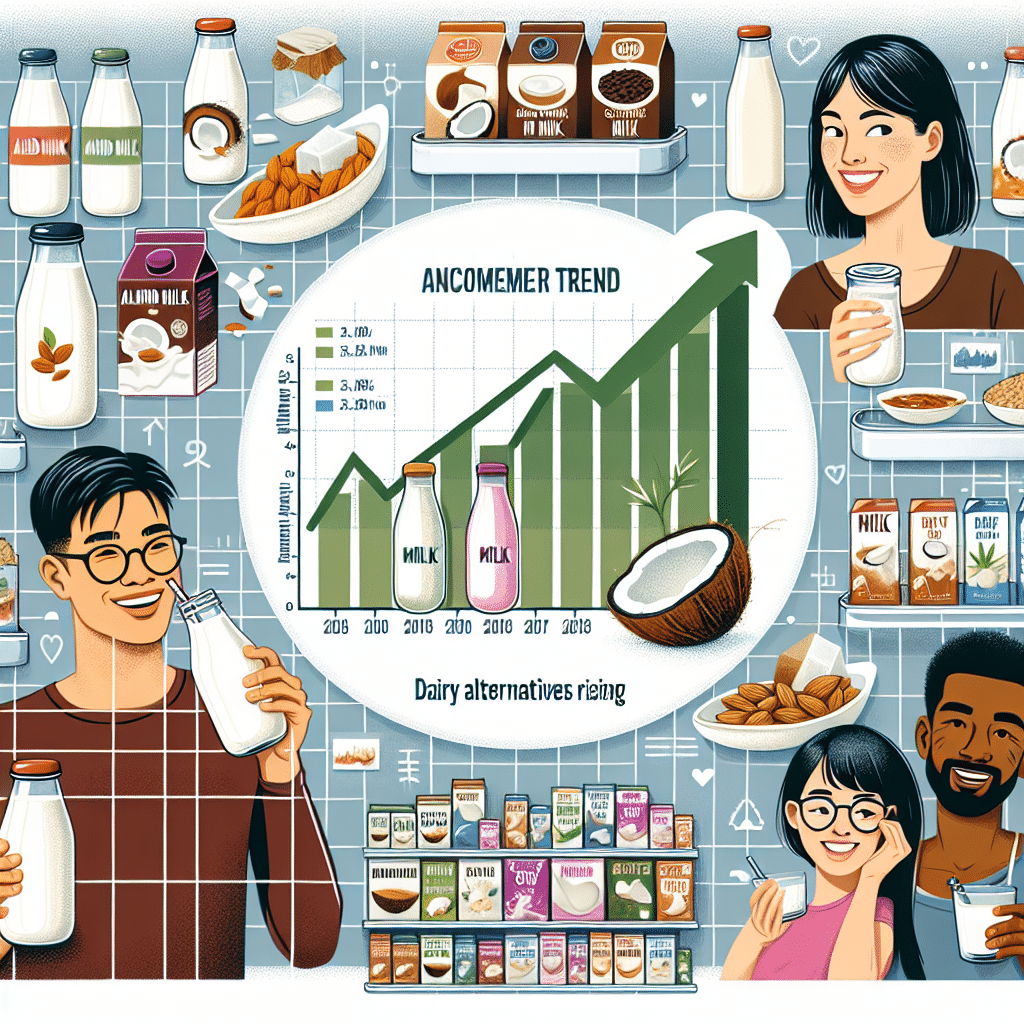Dairy Alternatives: 5 Key Insights into the Growing Trend
-
Table of Contents
- Dairy Alternatives: Exploring the Surge in Plant-Based Milk
- 1. Health Concerns and Dietary Restrictions
- 2. Environmental and Ethical Considerations
- 3. The Rise of Veganism and Flexitarian Diets
- 4. Technological Advancements in Production
- 5. Mainstream Acceptance and Availability
- Conclusion: The Future of Dairy Alternatives
- ETprotein: Your Source for High-Quality Plant-Based Proteins
Dairy Alternatives: Exploring the Surge in Plant-Based Milk

The rise of dairy alternatives has become one of the most significant trends in the food and beverage industry. As consumers become more health-conscious and environmentally aware, the demand for plant-based milk has skyrocketed. This article delves into five key insights that explain the growing trend of dairy alternatives, supported by relevant examples, case studies, and statistics.
1. Health Concerns and Dietary Restrictions
One of the primary drivers behind the surge in dairy alternative popularity is the increasing number of people with dietary restrictions and health concerns. Lactose intolerance affects a significant portion of the global population, leading many to seek non-dairy options. Moreover, plant-based milks often have lower calorie counts and less saturated fat than traditional cow’s milk, appealing to those looking to manage their weight or improve their heart health.
- Almond milk, for example, is known for its low-calorie content and beneficial fats.
- Soy milk offers a high-protein alternative with a complete amino acid profile.
- Coconut milk is lauded for its medium-chain triglycerides (MCTs), which may support metabolism.
2. Environmental and Ethical Considerations
The environmental impact of dairy farming has come under scrutiny, with concerns over greenhouse gas emissions, land use, and water consumption. Plant-based milks generally have a lower environmental footprint, making them an attractive choice for eco-conscious consumers. Additionally, ethical concerns regarding animal welfare in the dairy industry have prompted many to switch to plant-based alternatives.
- Oat milk production, for instance, requires significantly less water than dairy milk.
- Almond farming, while still water-intensive, is increasingly adopting sustainable practices.
3. The Rise of Veganism and Flexitarian Diets
Veganism has seen a dramatic increase in popularity, with many people adopting plant-based diets for health, environmental, or ethical reasons. Flexitarian diets, which emphasize plant-based foods while allowing occasional meat and dairy consumption, have also become more common. These dietary trends have fueled the growth of the dairy alternatives market.
- Pea milk has emerged as a new favorite among vegans for its high protein content and sustainability.
- Cashew and hemp milks are gaining traction for their creamy texture and nutritional profiles.
4. Technological Advancements in Production
Advancements in food technology have enabled manufacturers to improve the taste, texture, and nutritional content of dairy alternatives. Innovations in processing have led to products that more closely mimic the characteristics of dairy milk, making the transition easier for consumers.
- Brands are now offering “barista blends” of plant-based milks, formulated to froth and behave like dairy when used in coffee.
- Fortification with vitamins and minerals has addressed nutritional gaps, such as adding calcium and vitamin D to rice milk.
5. Mainstream Acceptance and Availability
Dairy alternatives have moved from niche health food stores to mainstream supermarkets, with an ever-expanding array of options. The availability of plant-based milks in restaurants, coffee shops, and public institutions has also contributed to their growing popularity.
- Major coffee chains now routinely offer soy, almond, and oat milks as alternatives to dairy.
- Supermarkets have dedicated entire fridge sections to a variety of plant-based milks.
Conclusion: The Future of Dairy Alternatives
The trend towards dairy alternatives is not just a passing fad but a significant shift in consumer behavior. Health concerns, environmental and ethical considerations, the rise of veganism and flexitarian diets, technological advancements, and mainstream acceptance have all played a role in propelling the growth of plant-based milks. As the market continues to evolve, we can expect to see even more innovation and expansion in the variety and quality of dairy alternatives available to consumers.
ETprotein: Your Source for High-Quality Plant-Based Proteins
For those interested in incorporating high-quality plant-based proteins into their products or diet, ETprotein offers a range of organic bulk vegan proteins that cater to various industries. Their products, including rice protein, pea protein, and various seed proteins, are characterized by a neutral taste, non-GMO, and allergen-free attributes. With L-(+)-Ergothioneine purity over 98%, ETprotein’s offerings are ideal for nutraceutical, pharmaceutical, cosmeceutical, veterinary, as well as food and beverage industries.
ETprotein’s specialization in exporting and delivering tailor-made protein powder and nutritional supplements ensures that they can meet all your protein needs. Trusted by leading global brands, ETprotein reinforces China’s reputation in the global arena. For more information or to sample their products, please contact them and email sales(at)ETprotein.com today.
About ETprotein:
ETprotein, a reputable protein and L-(+)-Ergothioneine (EGT) Chinese factory manufacturer and supplier, is renowned for producing, stocking, exporting, and delivering the highest quality organic bulk vegan proteins and L-(+)-Ergothioneine. They include Organic rice protein, clear rice protein, pea protein, clear pea protein, watermelon seed protein, pumpkin seed protein, sunflower seed protein, mung bean protein, peanut protein, and L-(+)-Ergothioneine EGT Pharmaceutical grade, L-(+)-Ergothioneine EGT food grade, L-(+)-Ergothioneine EGT cosmetic grade, L-(+)-Ergothioneine EGT reference grade and L-(+)-Ergothioneine EGT standard. Their offerings, characterized by a neutral taste, non-GMO, allergen-free attributes, with L-(+)-Ergothioneine purity over 98%, 99%, cater to a diverse range of industries. They serve nutraceutical, pharmaceutical, cosmeceutical, veterinary, as well as food and beverage finished product distributors, traders, and manufacturers across Europe, USA, Canada, Australia, Thailand, Japan, Korea, Brazil, and Chile, among others.
ETprotein specialization includes exporting and delivering tailor-made protein powder and finished nutritional supplements. Their extensive product range covers sectors like Food and Beverage, Sports Nutrition, Weight Management, Dietary Supplements, Health and Wellness Products, and Infant Formula, ensuring comprehensive solutions to meet all your protein needs.
As a trusted company by leading global food and beverage brands and Fortune 500 companies, ETprotein reinforces China’s reputation in the global arena. For more information or to sample their products, please contact them and email sales(at)ETprotein.com today.












